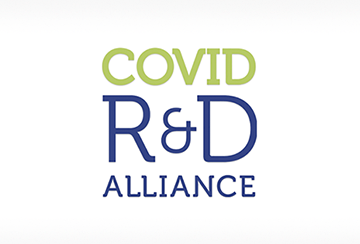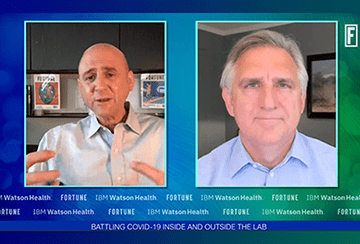While most of our genes are designed to make just one protein, some immune genes can be shuffled to make an astonishing array of different proteins called antibodies. Flavius Martin, Amgen’s vice president for oncology and inflammation research, explains these versatile genes and their potential to lead to a COVID-19 therapy.
How is the DNA in our immune system different? How does it protect us from so many different threats?
B cells and T cells are classes of white blood cells that have special properties compared to other cells in the body. They are equipped with machinery that gives them this almost magical ability to diversify the particular proteins they make. By combining different pieces of DNA, they can create an almost unlimited variety of receptors and antibodies. There is a constant war between our immune system and the microbial world, and this special ability of our T cells and B cells has evolved to keep up with the diversity of viruses and bacteria we might encounter.
How many different types of receptors and antibodies can these cells make?
In theory, the number is almost unlimited, but in any given individual, it’s in the billions. In addition to the machinery which gives rise to this enormous diversity, B cells have another amazing process which occurs after a B cell encounters a microbe it can bind to. When that happens, the B cell starts to rapidly mutate to try to adjust its fit and become even better at recognizing the microbe. When specific B cells and T cells are very successful at fighting a particular virus or bacteria, they produce memory cells to protect against future infections from the same microbe. If you’re exposed again, the memory cells can respond in a couple of days by making antibodies that help the body fight off the infection.
Are some antibodies better than others at fighting a dangerous virus like SARS-CoV-2?
The immune system tries to make every antibody that it can make against a virus, but various individuals do it in different ways. First, it depends on how healthy your immune system is. It’s more robust when you are younger, and it could be compromised if you have an illness like cancer or autoimmune disease, and you may be receiving treatments that suppress immunity. It also depends on which antibodies you generate and you have available to fight the virus. Some antibodies are just binders—they can bind to the virus but they are not very good at neutralizing its activity. Others are very good at eliminating the virus or virus-infected cells.
When you are looking to make a potential neutralizing antibody therapy, as Amgen and Adaptive Biotechnologies are now doing, the goal is to find very special antibodies that can neutralize a broad panel of virus strains that have evolved in different parts of the world and different individuals. The antibodies we are looking for are a lot rarer than one in a million—we have to go through billions and billions of cells in an efficient way. But together, our two companies have the right capabilities to potentially do this.
Can you briefly describe those capabilities?
Adaptive Biotechnologies can do very deep DNA sequencing on large numbers of antibody-making B cells taken from individuals whose immune systems were able to defeat COVID-19. Adaptive can do this rapidly and on a massive scale by using artificial intelligence and machine learning to analyze the results and identify the genes that might make potent antibodies to SARS-CoV-2.
Once we find these genes, we need to make and screen thousands of antibodies that bind the proteins on the coronavirus that we want to target. At Amgen, we have a deep understanding of the immune system, which will help us to make technical decisions involved in designing and running large antibody screens. We are also very strong in antibody engineering and drug development. For example, we know how to alter the design of antibodies in ways that make them easier to manufacture or help them to work longer in the body.
And finally, we have our deCODE Genetics subsidiary in Iceland, which is sequencing the DNA of the virus from many individuals in Iceland who has been infected. They have the analytical capabilities to integrate this information with SARS-CoV-2 sequence data collected around the globe. That can help us to figure out which parts of different coronavirus proteins are the least likely to be mutated, which will guide us in selecting the antibodies to advance. In the end, we may need a cocktail of several antibodies to try to cover the majority or all of the viral strains we have seen.
In addition to sequencing the virus, deCODE also has in-depth genetic data on the Icelandic population, including individuals who have been infected with SARS-CoV-2. Those genetic insights could be very helpful in answering all sorts of questions, such as determining if certain genes might make you more likely or less likely to develop severe complications if you get infected. The power of putting the viral genetics together with the human genetics could be very useful in guiding drug development and helping societies to fight this terrible illness.
Forward-Looking Statements
This communication contains forward-looking statements that are based on the expectations and beliefs of Amgen as of March 31, 2020, and which are statements made as of such date (except for any statements relating to our collaboration with Adaptive Biotechnologies, which are made as of April 2, 2020). All statements, other than statements of historical fact, are statements that could be deemed forward-looking statements, including any statements on the outcome, benefits and synergies of collaborations, or potential collaborations, with any other company, including Adaptive Biotechnologies (including statements regarding such collaboration’s ability to discover and develop fully-human neutralizing antibodies targeting SARS-CoV-2 to potentially prevent or treat COVID-19), BeiGene, Ltd., or the Otezla® (apremilast) acquisition, including anticipated Otezla sales growth and the timing of non-GAAP EPS accretion, as well as estimates of revenues, operating margins, capital expenditures, cash, other financial metrics, expected legal, arbitration, political, regulatory or clinical results or practices, customer and prescriber patterns or practices, reimbursement activities and outcomes, effects of pandemics or other widespread health problems such as the ongoing COVID-19 pandemic on our business, and other such estimates and results. Forward-looking statements involve significant risks and uncertainties, including those discussed below and more fully described in the Securities and Exchange Commission reports filed by Amgen, including our most recent annual report on Form 10-K and any subsequent periodic reports on Form 10-Q and current reports on Form 8-K. Unless otherwise noted, Amgen is providing this information as of the date of this communication and does not undertake any obligation to update any forward-looking statements contained in this document as a result of new information, future events or otherwise.
No forward-looking statement can be guaranteed and actual results may differ materially from those we project. Our results may be affected by our ability to successfully market both new and existing products domestically and internationally, clinical and regulatory developments involving current and future products, sales growth of recently launched products, competition from other products including biosimilars, difficulties or delays in manufacturing our products and global economic conditions. In addition, sales of our products are affected by pricing pressure, political and public scrutiny and reimbursement policies imposed by third-party payers, including governments, private insurance plans and managed care providers and may be affected by regulatory, clinical and guideline developments and domestic and international trends toward managed care and healthcare cost containment. Furthermore, our research, testing, pricing, marketing and other operations are subject to extensive regulation by domestic and foreign government regulatory authorities. We or others could identify safety, side effects or manufacturing problems with our products, including our devices, after they are on the market. Our business may be impacted by government investigations, litigation and product liability claims. In addition, our business may be impacted by the adoption of new tax legislation or exposure to additional tax liabilities. If we fail to meet the compliance obligations in the corporate integrity agreement between us and the U.S. government, we could become subject to significant sanctions. Further, while we routinely obtain patents for our products and technology, the protection offered by our patents and patent applications may be challenged, invalidated or circumvented by our competitors, or we may fail to prevail in present and future intellectual property litigation. We perform a substantial amount of our commercial manufacturing activities at a few key facilities, including in Puerto Rico, and also depend on third parties for a portion of our manufacturing activities, and limits on supply may constrain sales of certain of our current products and product candidate development. An outbreak of disease or similar public health threat, such as COVID-19, and the public and governmental effort to mitigate against the spread of such disease, could have a significant adverse effect on the supply of materials for our manufacturing activities, the distribution of our products, the commercialization of our product candidates, and our clinical trial operations, and any such events may have a material adverse effect on our product sales, business and results of operations. We rely on collaborations with third parties for the development of some of our product candidates and for the commercialization and sales of some of our commercial products. In addition, we compete with other companies with respect to many of our marketed products as well as for the discovery and development of new products. Discovery or identification of new product candidates or development of new indications for existing products cannot be guaranteed and movement from concept to product is uncertain; consequently, there can be no guarantee that any particular product candidate or development of a new indication for an existing product will be successful and become a commercial product. Further, some raw materials, medical devices and component parts for our products are supplied by sole third-party suppliers. Certain of our distributors, customers and payers have substantial purchasing leverage in their dealings with us. The discovery of significant problems with a product similar to one of our products that implicate an entire class of products could have a material adverse effect on sales of the affected products and on our business and results of operations. Our efforts to collaborate with or acquire other companies, products or technology, and to integrate the operations of companies or to support the products or technology we have acquired, may not be successful. A breakdown, cyberattack or information security breach could compromise the confidentiality, integrity and availability of our systems and our data. Our stock price is volatile and may be affected by a number of events. Our business performance could affect or limit the ability of our Board of Directors to declare a dividend or our ability to pay a dividend or repurchase our common stock. We may not be able to access the capital and credit markets on terms that are favorable to us, or at all.



